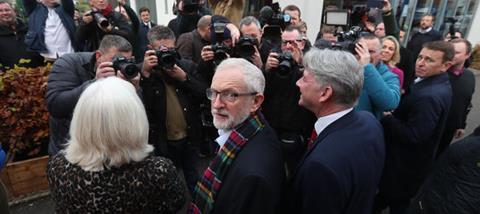
How did you come to be involved in this report?
I've been on the board of EHRC for about two and a half years. I was appointed, as one of last round of commissioners appointed the EHRC, which is the equality and human rights body for Great Britain. We are essentially the regulator for the Equality Act, and also the National Human Rights Institution. It's our role to protect and uphold equality and human rights across the country.
One of the things that we've been working on since May of last year, as a result of all the serious public concern there has been about allegations of anti-Semitism in the Labour Party, and then following two formal complaints made to us by the Campaign Against Antisemitism and the Jewish Labour Movement, a formal investigation under our powers under the Equality Act to find out if the Labour Party has committed unlawful acts against the Equality Act in relation to Judaism as a religion, or Jewish ethnicity. And we published a report yesterday after 16 months of hard work.
What were the findings?
We found there were unlawful acts of indirect discrimination and harassment for which the Labour Party is responsible. We've served a formal unlawful act notice on the party and the party now has to produce an action plan within six weeks, by 10 December, to address our findings and recommendations.
Essentially, we found that it’s clear the Labour Party isn't living up to its stated commitments to have zero tolerance of anti-Semitism. We found a culture within the party which, at best, didn't do enough to prevent anti-Semitism, and at worst, seemed to have accepted it. We found serious failings in leadership and an inadequate process for handling anti-Semitism complaints. And in particular, we found a clear contrast between the way that anti-Semitism complaints were dealt with and other types of complaints, particularly sexual harassment. With sexual harassment, there was some good training in place for those dealing with the complaints, there was a good, fair process. For anti-Semitism that just wasn't there, despite the fact that it has been a big issue for the Labour Party; there's been lots of media attention for several years now. It's that which led us to conclude that really, the Labour Party could have done more to tackle anti-Semitism, if they'd chosen to do so.
And just to expand very slightly on the three unlawful acts we found. First of all, there was unlawful political interference in the complaints process by the leader of the opposition's office. Secondly that the training was just completely inadequate…And finally, the party is responsible, in law, for unlawful acts of harassment carried out by some of its members. We've identified two cases in particular: Ken Livingston and Pam Bromley.
What about your recommendations?
So we've made a whole series of recommendations, but probably the two that are of most interest, in terms of change, is: first of all we recommend that there's got to be an acknowledgement by the party of the problems that have been caused by the complaints process, but particularly the political interference. And we welcome the fact that Keir Starmer made a very strong statement yesterday, saying that he would he would do that. But secondly, we've recommended that there should be an independent process until trust is rebuilt, so that essentially the Labour Party needs to set up something independent to handle anti-Semitism complaints until that trust is restored.
How did you feel about Jeremy Corbyn’s response?
Essentially Jeremy Corbyn's response to this is a matter for him, and the way that that's dealt with is a matter for the Labour Party…we will monitor carefully how all that develops. Our real concern is that it's not just about Jeremy Corbyn, it is about the overall culture of the party and the overall leadership, and there's a lot of work to be done in making sure that that changes. We welcome so far the steer that has been given by the party and by Sir Keir Starmer. We look forward to working with them on that action plan, and we will hold them to account to make sure that it's done properly.
You’re a Christian yourself, what part, if any, did this play in how you went about your work?
I mean I'm committed to the ideas of equality and human rights because of my faith and because I believe, as Genesis chapter one tells us, that all human beings are made in the image of God and therefore have inherent dignity and value. That gives us a real responsibility to make sure people are respected and given that dignity in their lives. The other thing that had an effect was that I have a really passionate commitment to freedom of religion, and so to see Jewish people threatened, or harassed because of their religion was something that I think is important to investigate properly, and then take action on if it's a problem. That's partly because, as a Christian, I believe, that's the way God treats us.
And finally, how do you think Christians should respond to something like this, when we hear about injustice in society. Is there a way we can pray?
Specific things to pray for in response to this investigation: it would be great to pray for the Labour Party, that this does lead to change, that they respond to this well and that it [the party] becomes a very safe space again, for people of all religions and backgrounds to be part of, if they want to. To pray for a wider impact on society; that this investigation has a positive impact on the public and political discourse in our country. That it takes place robustly and freely, but in a way that doesn't harass or discriminate against anybody. And thirdly, that it has a good impact on freedom of religion, and people's freedom to express their religion and be part of any organiation regardless of their faith. The Bible teaches us that Christians should be willing to stand up against injustice wherever we see it, and so I would encourage all your listeners to be fearless in doing what they can when they see [injustice] happening in whatever sphere of life.
Alasdair Henderson is a barrister at 1 Crown Office Row, specialising in public law, human rights, employment law and equality law. He previously worked in Rwanda for International Justice Mission, investigating cases of land rights violations. He has been involved in several of the most high-profile public inquiries of recent years, including the Al-Sweady Inquiry, Leveson Inquiry, Litvinenko Inquiry and the Independent Inquiry into Child Sexual Abuse




























